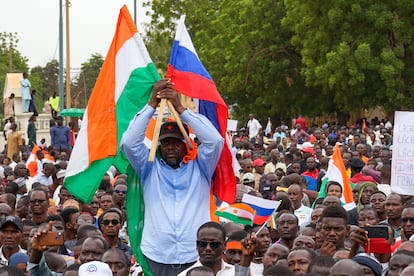Attacks by jihadist groups in Niger intensify in climate of instability following coup
Ousted President Mohamed Bazoum had implemented measures to combat terrorism but violence has spiked in the weeks since the July 24 military takeover

Armed terrorist groups operating in Niger have intensified their attacks since the July 26 coup d’état, causing over 100 deaths, including those of around 30 military personnel, in just three weeks. One of the arguments put forward by the coup leaders for their seizure of power was the failure of the government to combat jihadist terrorism and the need for a different approach, but the policies of dialogue, community negotiation and reinsertion implemented by ousted President Mohamed Bazoum were beginning to yield results with a decrease in attacks registered in 2022 and 2023. In the three weeks following the military uprising, that dynamic appears to have been broken.
Attacks have been carried out by the two arms of Al-Qaeda and Islamic State operating in Nigeria’s Tillabéri region — the Support Group for Islam and Muslims (JNIM) and the Islamic State Sahel Province (ISSP), respectively. The deadliest took place on August 15 near Ayorou, when ISSP attacked three villages, killing at least 50 civilians. On the same day, JNIM ambushed a military convoy near Kotougou, killing 17 soldiers and stealing military equipment.
“It is clear that there has been an intensification of jihadist violence since the coup,” says Bakary Sambe, director of the Timbuktu Institute, a research center specializing in terrorism in the Sahel. “There have been more deaths in three weeks than since Bazoum came to power in 2021. Terrorist groups are taking advantage of the instability and the vacuum created by the military takeover. Those in charge of security are now sitting on the seat of power in Niamey and this is being exploited by armed groups.”
After steady increases since 2018, deaths attributed to jihadist violence in Niger had dropped in 2022 and 2023, the non-governmental organization Acled stated in a report published on August 3, with a particularly notable downturn this year. “In the first months of 2023, political violence decreased by 39% compared to the previous six-month period, from July to December 2022. Attacks against civilians were down 49% and resulting deaths fell by 16%. However, operations by the Nigerian security forces increased by 32%, as part of an ongoing effort to counter insecurity,” noted the report.
To combat jihadist violence, Bazoum had launched a battery of initiatives that included the promotion of local peace agreements between communities, development projects for the areas most affected by violence, negotiation with Katiba Macina leaders of Nigerien nationality, reintegration programs for terrorists and the so-called peace caravans to convince communities to cooperate with the authorities and turn their backs on armed groups. This strategy had been criticized inside Niger, particularly among the defense and security forces, but earned praise from both Niamey’s international partners and local communities.
Ecowas rejection
The Economic Community of West African States (Ecowas) has expressed its rejection of the three-year transition proposal announced last Saturday by General Abdourahamane Tchiani, the leader of Niger’s military junta. The regional body considers the military’s proposals “unacceptable” and “a smokescreen.” Ecowas Commissioner for Political Affairs, Peace and Security, Abdel-Fatau Musah, urged the military junta to “release Bazoum without preconditions and restore constitutional order without further delay,” as reported by Reuters.
Likewise, after a week of intense debate, the African Union (AU) Peace and Security Council has made public its position on Niger, limiting itself to “taking note” of the Ecowas decision on the deployment of a military force, without expressing explicit support for such a measure. However, it has expressed its “solidarity” with Ecowas’ diplomatic efforts and its strong support for the “peaceful restoration of constitutional order.” The AU has suspended Niger and firmly rejects the coup d’état, while also urging any non-African country or force to refrain from intervening in the crisis.
On Monday, the government of Algeria, which shares a 950-kilometer (590-mile) border with Niger, rejected a request by the French government to use its airspace in the framework of a possible military intervention in Niger. According to Radio Algeria, Algiers’ response to France’s request was “firm and unequivocal.”
Moreover, Turkey has joined the list of countries that have expressed their rejection of a possible military intervention. On Sunday, Turkish President Recep Tayyip Erdogan told the media: “I do not share the decision of Ecowas to intervene militarily in Niger. Following this decision, Mali and Burkina Faso have warned that such an intervention would push them into war. A military intervention in Niger would spread instability to many African countries.”
Sign up for our weekly newsletter to get more English-language news coverage from EL PAÍS USA Edition
Tu suscripción se está usando en otro dispositivo
¿Quieres añadir otro usuario a tu suscripción?
Si continúas leyendo en este dispositivo, no se podrá leer en el otro.
FlechaTu suscripción se está usando en otro dispositivo y solo puedes acceder a EL PAÍS desde un dispositivo a la vez.
Si quieres compartir tu cuenta, cambia tu suscripción a la modalidad Premium, así podrás añadir otro usuario. Cada uno accederá con su propia cuenta de email, lo que os permitirá personalizar vuestra experiencia en EL PAÍS.
¿Tienes una suscripción de empresa? Accede aquí para contratar más cuentas.
En el caso de no saber quién está usando tu cuenta, te recomendamos cambiar tu contraseña aquí.
Si decides continuar compartiendo tu cuenta, este mensaje se mostrará en tu dispositivo y en el de la otra persona que está usando tu cuenta de forma indefinida, afectando a tu experiencia de lectura. Puedes consultar aquí los términos y condiciones de la suscripción digital.









































